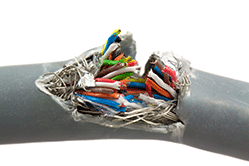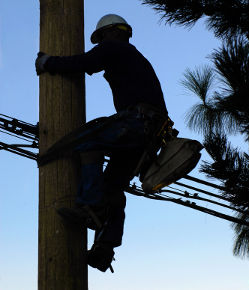Blog posts tagged broadband
The tricks to finding the right business broadband
It goes without saying that every successful business needs a strong internet presence. (Ok, so I said it anyway.)
The internet is likely to be one of the main ways customers find you, contact you, and check up on you via reviews and recommendations. And that’s why having fast, reliable broadband is of critical importance.
Not all broadband is equal
If you’re looking for a new broadband provider, keep in mind that not all services are created equal.
It can be tempting to use a home broadband package for business, particularly if you work from a home office. If you’re considering this, weigh up the pros and cons carefully.
Although business packages do sometimes cost a little more, they typically offer priority support, fewer download restrictions and guaranteed speeds.
How to compare packages
You can compare business broadband deals on websites like broadbandchoices.co.uk, Gocompare.com and uSwitch.com.
This is an excellent way to get a feel for what packages are available and which fit your budget. As you explore the options, you can begin creating a shortlist of packages that might work for your business.
When comparing packages, don’t just take the connection speed into account.
If you can find the information, look at each provider’s contention ratio, too. This measures how many customers share available bandwidth in a given area.
A provider with a contention ratio of 20:1 is likely to offer a connection that’s more consistently fast than one with a contention ratio of 40:1.
Also be aware of data limits, particularly with lower-priced packages.
If you hit your download limit during any given month then you’ll be forced to pay for an extra data allowance. Unlimited packages are worth the money, especially if your business sends and receives lots of large files.
Check out support and service
You can almost guarantee that if something goes wrong with your broadband, it’ll happen at an inconvenient time. And that’s when you’ll be glad you paid a little extra for 24/7 support or priority service.
See if your chosen providers publish average response times on their website. You can even give them a ring to see how long it takes them to pick up.
You might also be able to get a government grant to boost your broadband. More information is available from the Connection Vouchers website.
Once you’ve narrowed down your supplier list, take your time over the decision. Don’t be afraid to call the broadband companies with any questions you have.
After all, you’ll need to rely on them, so your clients can rely on you.
A new hope for businesses that can't get broadband?
 With average broadband speeds rising steadily, you could be forgiven for thinking that all is well with the UK's internet infrastructure.
With average broadband speeds rising steadily, you could be forgiven for thinking that all is well with the UK's internet infrastructure.
But there's still a distinct divide between the broadband 'haves' and the 'have nots'.
What's more, since the Rural Community Broadband Fund — tasked with bringing fast broadband to remote parts of England — was wound up earlier this year, it's unclear what new initiatives are available to bridge that gap.
The vast majority of business broadband connections are supplied via a physical connection, which means you have a wire (either a copper phone line or fibre optic cable) running into your premises. But wireless options are growing fast.
Can you use 4G?
Although 4G connections are mainly used by people on the move, in strong signal areas they can match or beat standard broadband connections for speed.
But because the 4G tariffs offered by mobile phone companies aren't designed for transferring large amounts of data, they're not a practical way to get your office connected.
Now a new provider, Relish, is using 4G technology to offer what it calls 'fibre-fast broadband' without any wires. The service is specifically designed to compete with the fixed-line broadband that businesses typically use on their premises
Just plug it in
When you sign up, Relish sends you a box to plug in to a power outlet.
It connects to the internet via 4G and then shares the connection around your business via Wi-Fi. Because there's no need for an engineer to connect your line, Relish claims you can be up and running the day after placing your order.
At £25 a month for what's billed as an 'unlimited' connection, and no line rental to pay on top, the pricing compares well to other broadband options.
So, what's the catch?
It's a service that sounds brilliant in theory. But the devil is in the detail. We've all had unreliable or slow mobile internet connections. Given that Relish uses the same technology, could it suffer in similar ways?
More fundamentally, it's only currently available in a small part of London — so it's no good at all for rural businesses.
Still, if you're stuck without a decent broadband connection, it's definitely worth keeping an eye on this company. Similar services are likely to spring up over the coming months, making wireless broadband a viable option for more of us.
Broadband and the British national obsession
 Well now. Here’s a news story that marries broadband speeds (one of the IT Donut’s own obsessions) with one of the Great British public’s favourite topics of conversation.
Well now. Here’s a news story that marries broadband speeds (one of the IT Donut’s own obsessions) with one of the Great British public’s favourite topics of conversation.
You see, property listings website Rightmove has released research suggesting that slow or non-existent broadband could wipe to 20% off the price of a house.
Cue — obviously — a story in the Daily Mail, complete with ropey stock photography and everything.
Broadband is the fourth utility
Even if you doubt the specifics of this research (a 20% reduction sounds like an awful lot), it certainly backs up the idea that broadband is fast becoming the fourth utility.
And it’s true: we treat our internet connections like turning on the lights or central heating. When we need it to get online, we expect to be able to do so.
A reminder for your business
The Rightmove story was released because the property firm has now added a broadband checker to its own website, to tell you what sort of connection you should get at a house you’re interested in.
But it provides an interesting reminder about the increasing importance of the web in our lives.
We spend more time online than ever. We’re connected not just at home, but nearly wherever we go. We’re buying things when we’re on the move.
If we’re at a point where broadband availability ranks alongside off-street parking, good schools and public transport links as factors in house desirability, surely it’s time to make the internet more central to your company, too.
In short, if you’re running a business — any sort of business — and you’re not thinking regularly about how the internet can help you, you’re missing a trick.
More than just a website
The internet is so ingrained in our lives that it’s not enough to build a website and leave it at that.
You need to stay up to date with new developments, like Google’s continued efforts to appeal to target mobile ads by location, or the fact that showrooming is rife. Is there any way you can turn these — and other — trends to your advantage?
You don’t need to transform how you do business. Nor do you need to panic.
But these days, people tend to turn to the internet first, no matter what they’re looking for. That creates new threats, and new opportunities. Are you ready to take advantage?
Broadband Britain is moving in the right direction – slowly

In the past, we've been pretty quick to criticise broadband provision in the UK. We've weighed in at various points over the last couple of years, commenting on the way broadband companies advertise connection speeds, wondering why we can't all just have the latest superfast connections and even poking fun at what the government thinks is an acceptable minimum connection speed.
So, now that a relatively good bit of broadband news has popped up, it seems churlish not to mention it.
Broadband speeds are picking up
According to research, the average broadband speed in the UK jumped an impressive 45% during 2013. Akamai's State of the Internet report — which covers the third quarter of 2013 — reckons the average connection speed here is 9.1 megabits per second (mbps).
The increase is largely down to increased availability and uptake of fibre broadband connections. These are significantly faster than traditional broadband connections, because they use modern fibre optic cables instead of ancient copper telephone wires.
That puts the UK well ahead of the global average of 3.6mbps. We outperform Germany, France, Spain and Italy too, although we're a little off the 12.5mbps average of the Netherlands.
Is fibre available in your area?
The problem with measuring average speeds is that this approach doesn't really represent the people and businesses at either end of the spectrum.
If your business is located in an area where fibre connections are available then you can be sitting pretty with a solid, fast connection of 38mbps+ for £30 or so a month.
Not bad, but the fibre rollout still has a way to go before it covers everyone in the UK. When you take every provider into account, apparently 73% of us could get a fibre connection if we wanted to.
The people outside that 73% will be relying on copper wires for a bit longer. Coverage is increasing, but it could be early 2016 before it hits 90%.
Quite simply, knowledge that the average broadband speed is 9.6mbps is scant consolation if you're unlucky enough to be struggling with a connection of just 1 — 2mbps.
Broadband Britain? It's improving, but there's still some way to go.
How to stop internet downtime crippling your business
 When your internet connection goes down, your business can suffer disruption that wastes your time and hits your bottom line.
When your internet connection goes down, your business can suffer disruption that wastes your time and hits your bottom line.
If that sounds all-too-familiar to you and your company, here are a few ways to reduce disruption caused by an unreliable internet connection.
1. Upgrade your old router
Consider upgrading your router if it’s more than five years old. Newer routers offer more reliable, stronger wireless signals, better security and faster downloads.
If you have laptops, smart phones or tablets that can operate using newer, faster wireless networking standards then make sure your router can perform at the same speed, too.
2. Check your computers for security problems
Security problems like malware and viruses can hit your internet speed by consuming your computer’s processing power and sending data across your internet connection.
Make sure you have good security software that’s working properly and gets regularly updated.
3. Reposition your router
If you rely on a wireless internet connection on your premises, where you position your router can dramatically affect the strength of the signal — and therefore the speed of your connection. Try and position it near the centre of your office, rather than leaving it in the corner by your phone socket.
If you still struggle to get a strong connection, consider getting a signal booster to improve coverage or connecting the most important devices to the router via a cable.
4. Check your contract
Some ‘unlimited internet’ packages aren’t actually unlimited. They have fair-use clauses or restrictions to ensure that one user’s heavy use doesn’t slow the service for others
If you exceed your package’s usage limit, you might be charged extra of have the speed of your connection capped. Your internet provider may also limit speeds at peak time, or slow access to sites that require a lot of bandwidth, like YouTube.
Ultimately, if your business requires a reliable, fast connection then you should consider investing in a fibre connection, if fibre is available in your area. However, these tips are a good way to make your connection more reliable without having to splash out on an upgrade.
- More ways to speed up your broadband
- Internet speed test
- Why your internet connection might be slower than you’d hoped
This is a guest post from Christian Nellemann, founder and group CEO of XLN Telecom, a specialist provider of small business broadband and phone services.
How to stop internet downtime crippling your business
 When your internet connection goes down, your business can suffer disruption that wastes your time and hits your bottom line.
When your internet connection goes down, your business can suffer disruption that wastes your time and hits your bottom line.
If that sounds all-too-familiar to you and your company, here are a few ways to reduce disruption caused by an unreliable internet connection.
1. Upgrade your old router
Consider upgrading your router if it’s more than five years old. Newer routers offer more reliable, stronger wireless signals, better security and faster downloads.
If you have laptops, smart phones or tablets that can operate using newer, faster wireless networking standards then make sure your router can perform at the same speed, too.
2. Check your computers for security problems
Security problems like malware and viruses can hit your internet speed by consuming your computer’s processing power and sending data across your internet connection.
Make sure you have good security software that’s working properly and gets regularly updated.
3. Reposition your router
If you rely on a wireless internet connection on your premises, where you position your router can dramatically affect the strength of the signal — and therefore the speed of your connection. Try and position it near the centre of your office, rather than leaving it in the corner by your phone socket.
If you still struggle to get a strong connection, consider getting a signal booster to improve coverage or connecting the most important devices to the router via a cable.
4. Check your contract
Some ‘unlimited internet’ packages aren’t actually unlimited. They have fair-use clauses or restrictions to ensure that one user’s heavy use doesn’t slow the service for others
If you exceed your package’s usage limit, you might be charged extra of have the speed of your connection capped. Your internet provider may also limit speeds at peak time, or slow access to sites that require a lot of bandwidth, like YouTube.
Ultimately, if your business requires a reliable, fast connection then you should consider investing in a fibre connection, if fibre is available in your area. However, these tips are a good way to make your connection more reliable without having to splash out on an upgrade.
- More ways to speed up your broadband
- Internet speed test
- Why your internet connection might be slower than you’d hoped
This is a guest post from Christian Nellemann, founder and group CEO of XLN Telecom, a specialist provider of small business broadband and phone services.
IT for donuts: can you use home broadband for business?
 IT for donuts is our regular Friday feature where we explain a tech term or answer a question about business IT.
IT for donuts is our regular Friday feature where we explain a tech term or answer a question about business IT.
This week: can you use home broadband for business?
Home broadband for business
Most broadband suppliers offer a range of packages for home and business users. You’ll usually pay more for a business package which, on the face of it, might look very similar to the equivalent home option.
Home and business packages usually use the same technology and infrastructure. Your data travels on the same wires no matter which you plump for.
And for that reason, sole traders and the smallest businesses should find a home connection more than adequate — as long as it has no download limit.
However, if losing your internet connection — even briefly — would cause you to lose money, then it’s probably worth paying extra for a business package.
What’s different about business broadband?
Business broadband packages tend to be a little more reliable and provide a better level of service. Every provider is different, but a business broadband package will typically offer:
- Better peak-time speeds. Internet service providers sometimes restrict connection speeds when lots of their customers are online at once. Often, business packages receive priority, meaning you won’t suffer the same restrictions.
- Faster uploads. Home packages are for people who download (receive) lots of data but upload (send) little. If your business uploads lots of data (for instance, to a cloud backup service), this can be limiting.
- Unlimited downloads. Many home packages restrict the amount of data you can download each month. Some business packages do, too — but the limits are usually more generous and unlimited services are more common.
- Better support. It’s when things go wrong that having business broadband should really pay off. You’ll often receive priority support and have a service level agreement, guaranteeing that problems will be fixed within a certain amount of time.
- Easier remote access. Many business packages include a static IP address, which identifies your systems on the internet and makes it easier for employees to connect remotely. Home broadband packages typically charge extra for this, or don’t offer it at all.
Choosing a broadband connection is about more than deciding whether to go for a home or business package. But as a general rule, home broadband packages are really only suitable for smaller businesses that could cope ok if their connection went down for a significant period of time.
Related information:
- How to cope without broadband
- Get the right broadband for your business
- Broadband supplier checklist
Previous IT for donuts posts:
Who will mourn the death of dial-up?

Beep-beep-beep-beep ... ring-ring, ring-CLICK, bzzzrrrrcscscscsssshhh-doiiiing-doiiiing ... you are now connected.
As older readers will remember, for years that was the sound of the internet. Back then, getting online wasn't a matter of simply flipping open your laptop or tapping the screen of your iPad.
You had to use a dial-up connection. This meant making sure your external modem (pictured) was switched on, checking nobody else was using the phone, then opening the connection on your computer and clicking connect.
After enduring 30 seconds of annoying fax machine-type noises, you'd be on the information super-highway, as we used to call it back then.
Starved of bandwidth
If you were lucky, your internet connection might hit the heady speeds of 56 kilobits a second. (For comparison, a typical broadband connection is about 100 times faster.)
At this point I was going to say that those were the days. Except they weren't. With barely enough bandwidth for low-quality streaming radio, YouTube was an impossibility, and every website took its time to load.
It wasn't all bad though. You could pass the time by guessing what images were of while they slowly resolved themselves on screen.
Oh, and you could play 'guess the phone bill'. With many services charged by the minute, it was common to ration your time online.
Dial-up is ending
These days, most of us are lucky enough to have a broadband connection. And while broadband in the UK has its faults, it has revolutionised the experience of using the internet.
Broadband has become so ubiquitous that when BT announced the end of its dial-up internet service last week, the most surprising thing was that it has kept it going for so long.
But while the vast majority of UK internet users moved to broadband years ago, there's still a small minority of people — mostly in rural areas — who are unable to get broadband.
BT says only a 'tiny number' of its customers were still using its dial-up service when they discontinued it, but has acknowledged that around 1,000 people won't be able to move to broadband because it's not available where they live.
Other dial-up options
And that's the thing. On the basis that any connection is better than none, dial-up does still have its uses. For people in areas not covered by broadband, it's often the only cost-effective way to get online. It can be handy in an emergency too.
For these reasons, the days of dial-up aren't quite over. Although BT no longer offers the service, a few other providers do:
- BT's subsidiary, Plusnet, continues to provide a dial-up option to its customers
- Free UK ISP and Free Dial-Up provide services the you can connect to and go, though we've never heard of them and so can't comment on their quality.
- Freeola also offers a dial-up service.
If you're in need of a dial-up connection, it's good to know they are still available. But speaking for myself, I'll be happy if I never hear that noise again.
Would you pay to make switching broadband simpler?
 A recent survey by ISPreview.co.uk found 62% of respondents think the process of switching broadband suppliers is confusing.
A recent survey by ISPreview.co.uk found 62% of respondents think the process of switching broadband suppliers is confusing.
That won't come as a surprise if you've ever tried to unpick the muddled web of ADSL, fibre and cable broadband, limited offer pricing, additional line rental costs, contract terms and MAC codes.
It's enough to put anyone off. The sheer length of this guide to switching would be funny, were broadband not such an essential service for consumers and businesses alike.
Easier broadband switching
It's good news then, that telecoms regulator Ofcom is aiming to sort out the process. A new, simpler solution should be unveiled later this summer.
|
However, although these efforts were supported by 93% of the survey's respondents, cost could be a significant problem.
To stop people being switched without their knowledge, Ofcom has suggested the new process may include a verification step.
Good for security, but as it would almost certainly cost broadband suppliers to implement this step, their customers could see prices rise.
Just 27% of respondents said they'd continue to support the process if it caused their monthly charge to increase, or incurred other extra fees.
It remains to be seen just how much costs could increase by, if anything. But as ever, we're unlikely to be in for a free lunch. If you want your broadband simpler, then you'll probably have to pay for it.
Believe it or not, UK broadband is pretty decent
 If you seem to spend much of your working day cursing your slow internet connection or turning your router on and off to get it working, then the latest statistics on UK broadband might come as a surprise.
If you seem to spend much of your working day cursing your slow internet connection or turning your router on and off to get it working, then the latest statistics on UK broadband might come as a surprise.
According to the EU Commission, the UK actually does pretty well when it comes to broadband prices, speeds and connectivity - at least compared to the other 26 EU states.
The latest figures show that a broadband connection with a speed of 8 - 12 megabits per second (mbps - that's typical for an ADSL connection that uses a standard phone line) costs an average of €19.78 a month. That's well under the overall EU average.
Similarly, if the figures are to be believed then 70% of the population now has access to so-called 'next generation' connections of 30mbps+, which are typically delivered via fibre-optic cables. That's well above the EU average.
|
Given that we live in a country where online shopping is high and internet businesses account for a significant slice of GDP, perhaps we shouldn't be surprised.
So, why are people's perceptions often so different? After all, we've moaned enough on our blog about the state of UK broadband.
Well, although the UK broadband market looks pretty healthy at face value, the headline figures do obscure a couple of important facts.
Speed discrepancies are common
Many businesses still find there's a big difference between the advertised 'up to' speed of their internet connection, and the speed they actually receive.
This is caused by the nature of the copper wires used for most broadband connections (we explain the issues in full here), but the result is that it can feel like you're paying for a connection you don't get.
The EU figures back this up. If you're using some sort of DSL connection (usually advertised as 'up to'), on average you only get 45% of the advertised speed. For instance, I'm writing this on an 'up to 20mbps' connection that tends to run at about 10mbps.
Many still can't get a next-gen connection
Although the EU figures suggest 70% of people can now opt for a faster fibre connection, that still leaves 30% of the population who can't. That's a significant proportion of businesses unable to benefit from properly fast connections that are reasonable value.
But then perhaps we shouldn't criticise this fact too harshly. The pace at which providers are rolling out this superfast broadband has increase significantly over the last year or so.
You can use this broadband availability checker to see what's available near you, or search for specific packages using uSwitch.
How do you find your broadband connection? Is it fast enough for your requirements?
Get the right broadband for your business

Comparing broadband packages is like comparing giraffes.
This is a guest post from Anthony Pearce, content manager at BroadbandDeals.co.uk.
Choosing the right broadband package for your business can be a daunting prospect. Although many companies make do with broadband packages designed for residential use, business broadband generally offers a more reliable service with better security.
Here are some key tips to help you find the right broadband package for your business.
1. Check your local broadband exchange
IT dealsSee the latest business tech bargains we've found online. Or buy IT equipment now from these trusted suppliers: |
Your local broadband exchange will determine what business broadband providers are available in your area, and what download speeds you can expect.
Enter your postcode in to the broadband checker at Sam Knows to find a wealth of information about your local broadband exchange and the packages available.
2. Static IP address
Your IP address is a set of numbers that identifies your business internet connection, allowing computers and servers to route data to the right place. Some business packages use dynamic IP addresses.
These can change frequently, so you need a static IP address (which doesn't change) if you want to make it easy for staff to connect to your network from home. Learn more about static and dynamic IP addresses.
3. Advanced security
It's important to think about security when choosing your business broadband. Although most business broadband providers do offer advanced security as standard, make sure it meets your needs, even if that means paying a little extra for additional protection.
4. Online backup
Many broadband providers also offer an online backup service. This can be a good way to back your key files up to remote servers, keeping them safe even if your systems fail.
A broadband package that offers online backup can form a core part of your backup strategy, but always ensure the service is reliable and safe.
5. Virtual private network (VPN)
A virtual private network service helps your staff securely connect to your company network when they're away from the office. It can also allow you to safely link computers and servers in different locations.
A VPN creates a secure 'tunnel' between two computers on the internet, allowing you to safely send data from place to place. You can learn about BT's VPN service here.
6. Compare business broadband deals
There are a number of broadband comparison websites that let you easily compare the latest business broadband deals available in the UK.
One of these websites is BroadbandDeals.co.uk (full disclosure: I work for this site). It has a business section where you can enter your office postcode and see the latest deals in your area.
- How to speed up your broadband connection
- Broadband supplier checklist
- Why does moving a broadband connection take so long?
Are we getting close to broadband Britain yet?
 A new report into the state of UK broadband was released this week by independent think tank The Policy Exchange. By giving it the title of The Superfast and the Furious, they've already elevated it above many official reports.
A new report into the state of UK broadband was released this week by independent think tank The Policy Exchange. By giving it the title of The Superfast and the Furious, they've already elevated it above many official reports.
What's more, its findings make interesting reading.
Availability or speed?
The report throws up an interesting contrast between the broadband priorities of businesses and those of individuals.
Of businesses questioned, 61% said they felt providing high broadband speeds in most (but not all) areas should be prioritised over ensuring basic broadband is available everywhere.
But when consumers were asked a similar question, 64% said that achieving good basic broadband coverage for the whole country is more important than chasing very fast speeds in some areas at the expense of others.
Can't we have both?
This dilemma seems to arise whenever the spectre of 'broadband Britain' hits the headlines. When culture secretary Jeremy Hunt pledged that the UK would have Europe's fastest broadband by 2015, the opposition's response was that this meant "millions of people will have to wait at least three more years for a broadband connection".
But isn't the choice something of a red herring? Doesn't the country that generates more money online than any other G20 nation deserve 100% coverage of superfast broadband?
Some way to go
While policy experts debate how best to spend the money allocated to our broadband infrastructure, things on the ground are still confusing. Back in September, research found only 34% of broadband users actually get the maximum speed that was advertised for their particular package.
What's more, a recent poll by broadband review site ISPreview found that a massive 42% of respondents are 'unhappy' with their current internet service provider (ISP).
Ok, that's a small improvement on when ISPreview asked the same question a year ago (44% of respondents were 'unhappy'), but it's still a long way from broadband nirvana, when we will all have super-reliable, superfast connections.
The internet contributes to over 8% of the UK economy, and the continued success of online businesses of all kinds is going to be vital if we are to see a return to strong growth in the coming years.
Affordable, reliable, fast internet connections are central to achieving that - so it's about time individuals and businesses in every part of the country were able to access the high-speed connections they deserve.
How's your internet connection? Could you do more with more speed?
- UK broadband still not good enough
- Why does moving a broadband connection take so long?
- Why your internet connection is slower than you'd hoped
(Image: Elliott Brown on Flickr.)
UK broadband: still not good enough

How fast is your broadband? (Image: krossbow on Flickr)
Come on coalition, pull your fingers out and get us the broadband we need. That could be the message to take from a recent ISPreview.co.uk poll, which found that of 1,600 broadband users questioned, only 34% actually received their desired internet connection speed.
Yes, that is the reality of the 'broadband Britain' we live in today. Most internet connections still rely on shonky old copper telephone wires, a technology which has been around since Alexander Graham Bell invented the dog and bone. As a result, we're stuck with connections that regularly fail to meet our expectations.
Broadband frustrations
Just to muddy the waters further, internet service providers frequently use best-case connection speeds in their advertising, even though most people don't have the slightest hope of ever achieving them.
It's no wonder we get frustrated. And that's before you bring the government into the picture. It has set a target minimum connection speed of 2Mbps (megabits per second), saying everyone in the country should be able to achieve it by 2015.
But to put things into perspective, the average connection speed in Latvia is 8.8Mbps. In South Korea it's over 15Mbps. (Source: Akamai State of the Internet.)
What's more, only 4.7% of the poll respondents said that 2Mbps was adequate for their needs. As Mark Jackson, founder of ISPreview.co.uk, explains: "Clearly 2Mbps isn't enough with only 4.7% of respondents claiming to need such a speed and everybody else wanting something far faster."
Perhaps the EU's Digital Agenda for Europe is more realistic. It wants 100% of people to have access to broadband at 30Mbps or above, but not till 2020.
Broadband bright spots
Although much of the UK still isn't getting the broadband it deserves, there are some bright spots. BT continues to roll out its Infinity service. Business packages start from £30 a month and include a prioritised service so your connection doesn't suffer at peak times. Its biggest competitor is Virgin Media, which offers its 60Mbps service for under £30 a month.
Both these services are good deals and should seriously outperform any broadband connection based on old-fashioned ADSL technology. But - of course - they're only available if your business is based in an area these providers cover. And that's the sticking point for many companies, particularly those based in more rural locations.
Is your broadband connection adequate? Do you pay through the nose for it? Leave a comment and let us know.
Friday Donut tip: how to speed up your broadband connection
 The most common form of internet connection in the UK comes down a standard telephone line. It's often called ADSL, and while it does the job, it can be a source of speed-related frustrations.
The most common form of internet connection in the UK comes down a standard telephone line. It's often called ADSL, and while it does the job, it can be a source of speed-related frustrations.
This is because it relies on hundred-year-old technology (copper telephone wires) to deliver fast, modern broadband.
Connection speeds are determined by a range of factors, including the distance between your premises and the local telephone exchange and local electrical interference. Our internet speed checker will indicate how fast your connection is.
To make sure you're getting the best connection your phone line can manage, here are three things to try:
1. Plug your router into the master phone socket
The master phone socket is the telephone socket on the wall where your phone line enters your business premises. It's best to plug your broadband router in here, because the master socket is least suscecptible to interference.
If the master socket is a long way from your business computers, plug the router in there anyway and run a network cable from it to your computers. Network cables are not affected by interference in the same way.
2. Use a good quality phone cable
The quality of the wire between your phone socket and broadband router can have an influence on speed too. Use the shortest wire you can - usually the best option is to use the wire supplied with your router.
Keep the wire away from sources of intereference, like other cables, mobile or cordless phones.
3. Disconnect the bell wire
This step is a little fiddlier and means taking the front off your telephone socket. If you're not comfortable doing that then skip it!
The bell wire (also called the ring wire) is a hangover from the days when old-fashioned telephones required an extra wire to make them ring. Many phone lines still have this wire, but the only thing it's good for is causing interference.
You can remove it quickly and easily - there's a really good online guide here, which even has nice clear photos.
How's your broadband connection speed? Have you found any easy ways to speed it up?
- Get the software you need in one go
- The little box that can save you lots of time
- How to stay on top of your Outlook inbox
Do you want your website to travel second class?

Shouldn’t we all have fast fibre optic connections? (Image: James Laurence Stewart on Flickr.)
If you pay attention to the business or technology press, you may have noticed the term ‘net neutrality’ popping up in articles. But what does it actually mean? And why should it matter to you and your business?
Net neutrality (or network neutrality) is the idea that all internet traffic should be treated equally. It’s how the internet works at the moment: no matter whether internet traffic is from the BBC iPlayer, your business blog, a video-conferencing service or any other source, it isn’t discriminated against.
Network providers can’t charge more to transfer it, or prioritise certain types of internet traffic over others.
Net neutrality also prevents internet service providers (ISPs) and governments from restricting what you choose to access. It gives you the freedom to view whichever sites or content you want, using any equipment you choose.
See a great visual representation of net neutrality >
The threat to net neutrality
To some extent, ISPs already restrict internet connectivity to their customers. Some perform ‘traffic shaping’ to limit the use of file sharing services. Others give voice and video traffic priority to make sure calls don’t break up.
So what’s the problem? Well, thankfully not much at the moment, but internet traffic is growing and broadband providers are doing everything they can to keep costs low and stay competitive.
Currently businesses pay their ISP for the internet connection they require (depending on what’s available in that location). Whether it’s broadband over a standard phone line or a fast fibre optic connection, the speed is only restricted by the type of connection and the package they choose.
But the end of net neutrality could see broadband providers signing lucrative contracts and exclusive agreements with favoured customers such as search engines. This would mean that your choice of ISP could determine the quality of your connection to certain websites, forcing you to choose them over other options.
What about your business?
One of the best things about the internet is how it has put small businesses on an equal footing with bigger competitors. The website for a local greengrocer will load just as fast as a supermarket’s website.
But without net neutrality, that could change. With its deep pockets, the supermarket could pay broadband providers to deliver its website faster, forcing its competitors backwards. The greatest rewards would only be available to those with the most to spend.
Today, many small businesses exist only online. So changes to the way the network is regulated will directly affect their success and even their livelihood.
Net neutrality in law
Last month the Netherlands became the first country in Europe to write the concept of network neutrality into national law. Mobile phone operators in particular are now banned from blocking or charging consumers extra for using internet-based communications services like Skype.
In the UK, things aren’t quite so advanced. Ofcom published a paper last year designed to promote debate on network traffic management. And the telecoms regulator is expect to clarify its stance on net neutrality sometime in this year. We’ll keep our eyes peeled, but I wouldn’t hold your breath!
We have also conducted our own Powernet research that shows UK businesses overwhelmingly support net neutrality. Only 19% believe that ISPs should be allowed to treat different types of traffic in different ways, and just 17% would be willing to pay for a top tier service.
So who chooses what your business does online? Well at the moment, you do, but in the future, things might not be so easy. That’s why we need government backing for net neutrality.
- How to choose an internet service provider
- Check internet speed with our online speed test
It's time to break down the broadband bull

By international standards, UK broadband isn't exactly super-speedy. But the worst thing is that when you buy it, often you have little idea what you're going to get.
Sure, your package might offer speeds 'up to 8Mbps', 'up to 16Mbps', or even (optimistically), 'up to 24Mbps'. But even if you know what 'Mbps' means, that 'up to' introduces massive uncertainty. You might end up with only a tenth of the promised speed, or worse.
It wouldn't be allowed elsewhere
In other industries, this wouldn't be allowed. Imagine if your car - which an enthusiastic salesman promised would do 'up to 100mph' - actually maxed out at 35.
You wouldn't stand for it. Yet with broadband, this kind of advertising is the norm.
The use of 'up to' stems from the way in which ADSL - which is how most of us get our broadband - works. It uses copper wires which were never designed for the purpose. And that makes speeds unpredictable.
We're relying on 1911 hardware to deliver 2011 connectivity. So if you're miles from a telephone exchange or your line is old and crackly, you won't get a good connection.
We want honest broadband
The obvious way to make our broadband better would be to introduce a modern, up-to-date broadband network. With guaranteed speeds, you could forget any 'up to' hassles.
And that is happening, albeit slowly. Some places can already get a fast fibre optic connection via Virgin Media or through BT's fledgling Infinity network. But those services won't reach many of us anytime soon.
So, while the rest of us are waiting for a fibre optic connection, ADSL providers need to shape up their act:
- Set charges to reflect real-world speeds. If I'm only going to get 10% of the advertised speed, I should only have to pay 10% of the advertised cost. That might give providers some incentive to improve things.
- Quote realistic speeds in advertising, not best case ones. Only a tiny proportion of broadband customers get the promised speeds (if any), so it's time advertising changed to reflect this. Even Ofcom seems to agree.
- Be open about fair use. Many packages limit what you can download each month to reduce network load. Hit your limit and your connection will crawl. But these limits are hard to understand. How much is 10GB?
Nowadays, internet access isn't just important to run your business. It's essential. So is it wrong to insist that broadband companies are open, honest and upfront about the speed of their services?
(Image of fibre optics from adrienneserra under a Creative Commons Attribution licence.)



